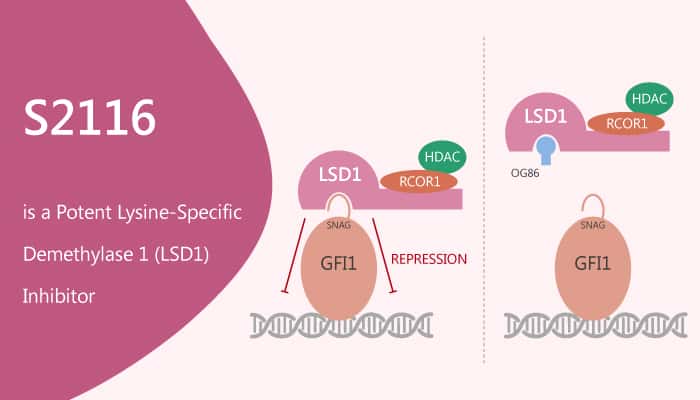Lysine-specific demethylase 1 (LSD1) is a human protein encoded by the kdm1a gene. Specifically, LSD1 is a flavin-dependent monoamine oxidase that demethylates monomethyl and dimethyllysine, especially H3K4 and H3K9. Besides, LSD1 regulates a variety of biological processes through dual function regulation of enhancer function. Overexpression of LSD1 is a fundamental abnormality in the development of T-cell leukemia and maintained in fully transformed T-cell acute lymphoblastic leukemia (T-ALL). Moreover, T-ALL is an aggressive hematological malignancy derived from T-cell progenitor cells, accounting for 15% and 25% of all cases in children and adults. Furthermore, LSD1 plays an indispensable role in several biological processes including ontogenesis, hematopoiesis, and carcinogenesis. These findings encourage the use of small-molecule compounds that inhibit LSD1 activity in the treatment of T-ALL. S2116 is a potent lysine-specific demethylase 1 (LSD1) inhibitor.

S2116 is a potent lysine-specific demethylase 1 (LSD1) inhibitor.
But, how does S2116 protect against T-ALL cells via LSD1? Let’s discuss it in detail.
In the beginning, S2116, an N-alkylated tranylcypromine (TCP) derivative, is a potent LSD1 inhibitor. Meanwhile, S2116 increases H3K9 methylation and reciprocal H3K27 deacetylation at super-enhancer regions. Nonetheless, S2116 induces apoptosis in TCP-resistant T-cell acute lymphoblastic leukemia (T-ALL) cells by repressing transcription of the NOTCH3 and TAL1 genes. Importantly, S2116 significantly retards the growth of T-ALL cells in xenotransplanted mice.
In addition, S2116 is particularly effective for T-ALL cell lines with the IC50 values between 1.1 µM for human T-ALL cell lines CEM and 6.8 µM for MOLT4. Particularly, S2116 modestly inhibits mitogen-activated normal T-lymphocytes. S2116 induces apoptosis and down-regulates the expression of NOTCH3 and TAL1 proteins in T-ALL cells.
Last but not the least, S2116 causes the size of subcutaneous tumors reduced to less than 20% of that in the untreated control. Obviously, S2116 has a T1/2 of 3.76 hours, a Cmax of 12.7 μM, and an AUC of 59.2 μM•h.
All in all, S2116 is a potent lysine-specific demethylase 1 (LSD1) inhibitor.
References:
Shiori Saito, et al. Clin Cancer Res. 2019 Mar 1;25(5):1601-1611.